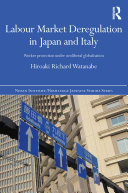

Most ebook files are in PDF format, so you can easily read them using various software such as Foxit Reader or directly on the Google Chrome browser.
Some ebook files are released by publishers in other formats such as .awz, .mobi, .epub, .fb2, etc. You may need to install specific software to read these formats on mobile/PC, such as Calibre.
Please read the tutorial at this link: https://ebookbell.com/faq
We offer FREE conversion to the popular formats you request; however, this may take some time. Therefore, right after payment, please email us, and we will try to provide the service as quickly as possible.
For some exceptional file formats or broken links (if any), please refrain from opening any disputes. Instead, email us first, and we will try to assist within a maximum of 6 hours.
EbookBell Team

5.0
58 reviewsJapan and Italy encountered severe economic problems in the early 1990s, and the governments had to deal with those issues effectively under the increasing neoliberal pressures of globalisation. In this context, labour market deregulation was considered an effective tool to cope with those economic problems. However, the forms and degrees of labour market deregulation in the two countries were quite different.
This book seeks to explain the differences in labour market deregulation policies between Japan and Italy, despite the fact that the two countries shared a number of similar political, social and labour market (if not cultural) characteristics. Uniquely, it takes a political, rather than economic or sociological perspective to provide a theoretical and empirical analysis of the processes of labour market deregulation in the two countries. The precarious working conditions of an increasing number of non-regular workers has become a prominent social issue in many industrialised countries including Japan and Italy, but the level of the protection for these workers depends on a country’s labour market policies, which are affected by the power resources of labour unions and labour policy-making structures. This book provides a useful perspective for understanding the root causes of this phenomenon, such as the diffusion of ‘neoliberal’ ideas aimed at promoting labour-market flexibility under globalisation, and demonstrates that there is still room for politics to decide the extent of deregulation and maintain worker protection from management offensives even in an era of globalisation.
Labour Market Deregulation in Japan and Italy: Worker Protection under Neoliberal Globalisation will appeal to students and scholars of Japanese politics, Italian politics, political economy and comparative politics.